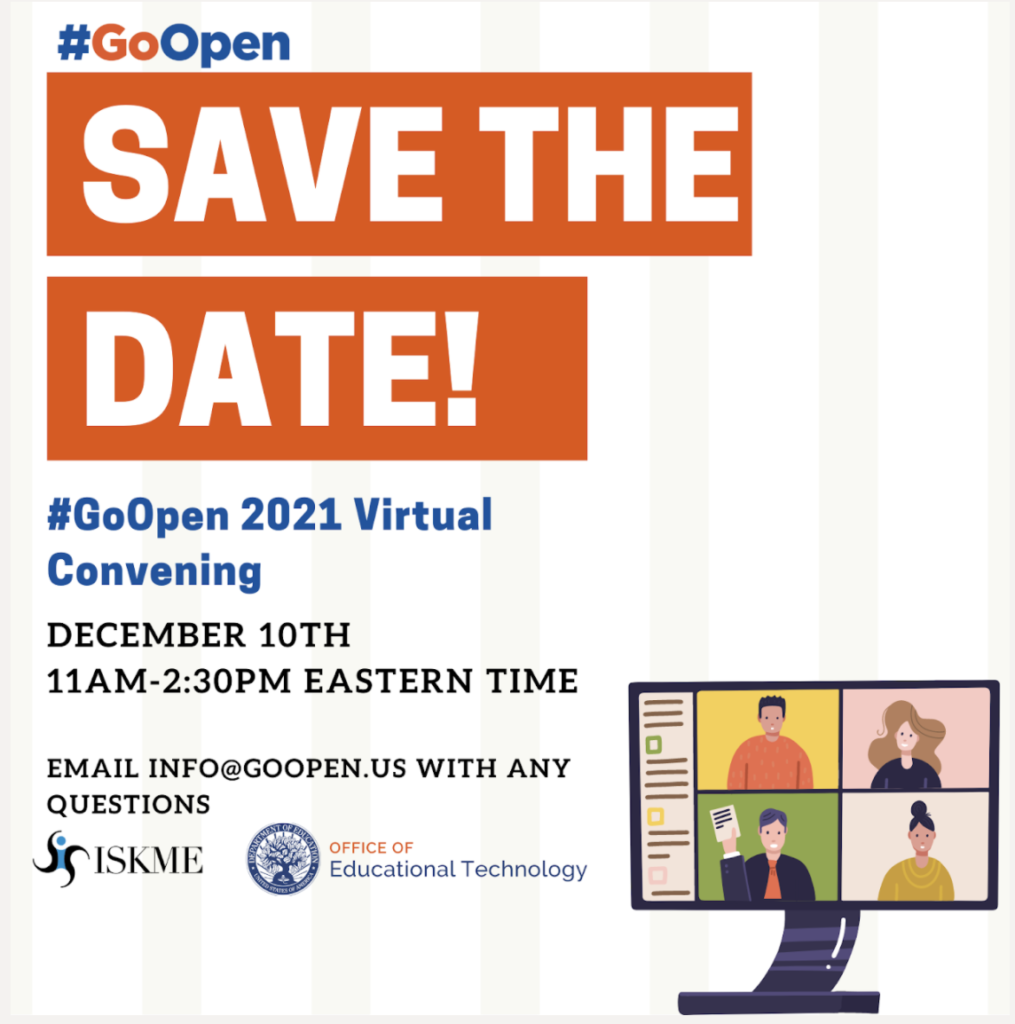
This is another blog post about badges, namely one badge. Lately, I’ve seen quite a few examples of badges, places that give badges, and reasons why badges should be given. In our digital era we can show our support of causes by “earning” the right to display badges. Badges can also provide digital records of professional achievements and activities. The frequency in which I see information about badges could be because I’ve been made aware of badges through the study of OER…so now I see or hear about them nearly everywhere I turn.
Today I saw an announcement about a forthcoming OER badge that interested me. I want that badge! Here’s the skinny on how to get one for yourself.
In a joint effort to continue to build awareness and implementation of OER, the Institute for the Study of Knowledge Management in Education (ISKME) and the US. Department of Education (ED) announced a new #GoOpen pledge and a virtual convening surrounding OER. Upon taking the pledge, each person will be presented with a #GoOpen digital badge to display their support for OER and #GoOpen.
Here’s the details about the #GoOpen Pledge of Support from the #GoOpen website. There is one pledge for states or districts, and one for individual educators:
The Pledge for States or Districts
The pledge is intended for a State Educational Agency (SEA) or Local Educational Agency (LEA) and represents a public commitment to the principles inherent in open education, demonstrated through support for the use of open educational resources (OER) for their principals, teachers, learners, and other interested parties. The pledge is intended to endure beyond changes in personnel at the SEA or LEA, and organizations will have a chance to renew their commitment every 3 years.
The [SEA/LEA] commits to support the #GoOpen initiative, and as a member of the initiative, we pledge to support open education by:
- Sharing new opportunities for open education alongside knowledge and evidence about what works, in our communications to all interested parties;
- Emphasizing open education as a means for providing equitable access to high- quality, flexible, low- or no-cost teaching and learning materials in our policies;
- Supporting ways for educators to adopt and use OER and include students as beneficiaries, contributors, and co-creators of OER, in our practices; and
- Offering rigorous and engaging learning experiences that are inclusive, culturally responsive, and accessible to all learners, in our commitment to equity and continuous improvement in education.
The Pledge of Participation for Individuals
The Department of Education also offers the opportunities for individual educators to take a Pledge of Participation to demonstrate their commitment to grow open education as part of their own work. Educators, leaders, and interested parties will have a chance to renew their commitment every 3 years.
As a Participant in the #GoOpen initiative, I pledge to support open education by:
- Endorsing open education as a mechanism for providing equitable access to high- quality, adaptable, low- or no-cost teaching and learning materials;
- Adopting OER and open educational practice;
- Sharing knowledge and evidence about successes and challenges locally and nationally;
- Supporting others to adopt OER and open educational practice, including students; and,
- Supporting learning experiences that are inclusive, culturally responsive, and accessible to all learners, in my commitment to equity and continuous improvement in education.
Invitation to the #GoOpen Convening
When: December 10, 2021, 11-2:30 Eastern Time
Where: Virtual via Zoom, details and registration forthcoming
Cost: Free of charge
The convening is to support educators in collectively working to expand access to high-quality open educational resources, toward scaling continuous improvement in education locally and nationally.
This special one-day event will feature a keynote speaker, a participatory working group activity, and Q&A. The event will span important open education topics, including diversity, equity, inclusion, problem solving within the classroom, and OER implementation and scaling.
Office of Educational Technology – ISKME – Licensed CC-BY 4.0
